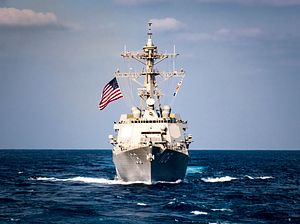The USS Carl Vinson strike group will arrive in waters off the Korean Peninsula this week, according to the White House. The message: The U.S. will not tolerate any further missile or nuclear testing by North Korea.
But reflecting on some recently declassified documents, President Donald Trump’s “armada,” as he described it, may only be encouraging a nuclear blast or some other action to provoke Washington.
According to Reuters, the state-run Rodong Sinmun newspaper said North Korea is “combat-ready to sink a U.S. nuclear-powered aircraft carrier with a single strike.”
A week or so before that — as the White House and Pentagon had strongly indicated the strike group was already on its way to Korea — North Korea’s Vice Foreign Minister Han Song-ryol told the Associated Press in an exclusive interview that Pyongyang “certainly will not keep our arms crossed in the face of a U.S. pre-emptive strike.”
A similar comment can be traced back to April 16, 1969, the day after North Korea shot down a U.S. reconnaissance plane in waters off the Korean Peninsula, killing all 31 on board.
“It’s good for them [the U.S.] to know that we won’t sit with folded arms,” said Pak Seong-cheol, North Korea’s foreign minister at the time.
Pak was speaking with former Soviet Ambassador to North Korea, N. G. Sudarikov, according to documents from Soviet archives donated to the Wilson Center by Kyungnam University.
“If we sit with folded arms,” Pak continues, “when a violator intrudes into our spaces, two planes will appear tomorrow, then four, five, etc. This would lead to an increase of the danger of war. But if a firm rebuff is given, then this will diminish the danger of an outbreak of war.”
Van Jackson, a political scientist and former Korea policy strategist at the Pentagon, analyzes this conversation and another in a recent article for the Wilson Center blog Sources and Methods.
The documents, Jackson writes, imply a number of things:
…North Korea believes military force has political value, escalation is a reliable means of de-escalation, provocations help deter ‘US aggression,’ and retaliating when attacked is essential to maintaining credible deterrence.
Essentially, Jackson is saying, North Korea sees an offensive nature as crucial to its survival.
Those documents are still relevant today, he told The Diplomat, because the major forces that determine North Korea’s strategic decisions are similar or the same as they were in the 1960s.
For one, North Korea’s “existential beef” continues to be primarily with the United States. On top of that, he says, North Korea is unable to rely on any “great power patrons.”
There are signs, however, that Russia may be willing to play a bigger role in supporting North Korea. And even though China appears to be fed up with Pyongyang, analysts say Beijing is unlikely to do anything that would truly destabilize the North.
Trump’s new North Korea policy dubbed “maximum pressure and engagement” indicates a door has been left open for dialogue.
But for now a path to talks seems foggy at best, nonexistent at worst. Yang Moo-jin, a professor at Seoul’s University of North Korean Studies, told The Diplomat he feels the U.S. is focused solely on pressure and sanctions.
He says Washington needs to be simultaneously gesturing to North Korea about a road to dialogue.
Many experts studying North Korea have said Trump’s military signaling – the “armada” for one — is flat out dangerous.
April 25 marks the anniversary of the founding of the Korean People’s Army, and North Korea has been known to show off its military might on or around important holidays.
According to 38 North, satellite imagery still indicates the North is prepared to conduct a nuclear test at any time.
If North Korea’s reputation, as analyzed by Jackson, holds up there’s little reason to believe Trump’s current threats will bring Pyongyang any closer to abandoning its nuclear weapons.
And Jackson urges policymakers in his article to heed the historical record of North Korea’s offensive nature or “risk inadvertent war.”
In his podcast, Pacific Pundit, he elucidates this history lesson, and other foreign policy, through hip hop.
He recites a warning from Q-Tip in the classic hit Scenario by A Tribe Called Quest.
“Don’t ever try to test, the water, little kid. Yo Mr. Busta Rhymes, tell um what I did.”
According to Busta Rhymes, Q-Tip has a violent past.
































